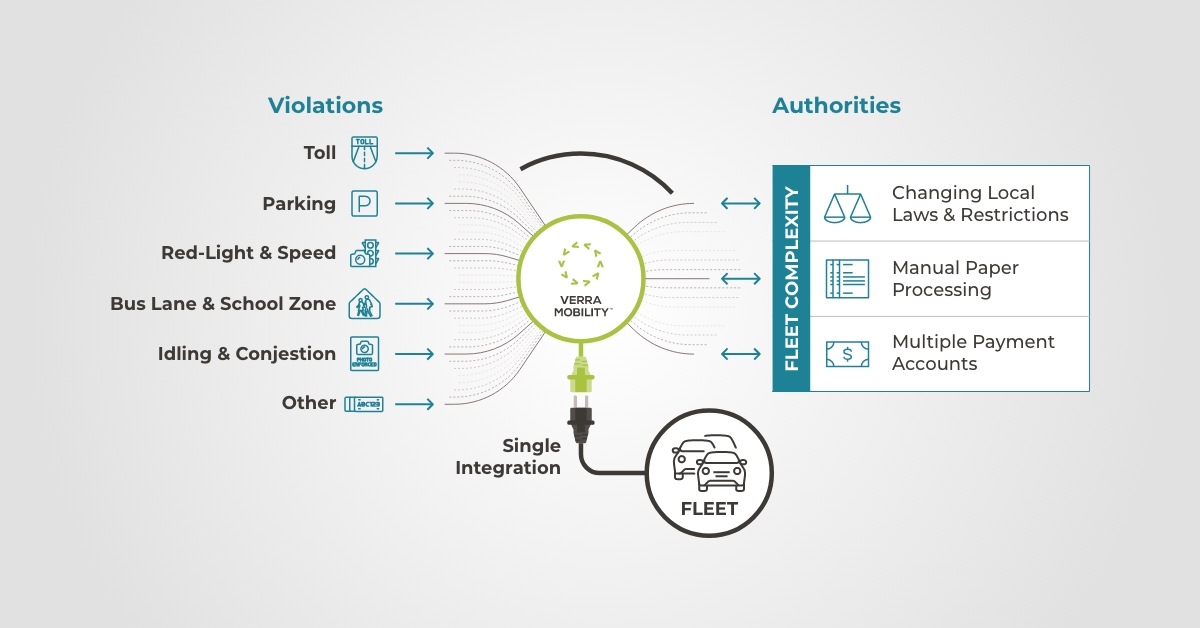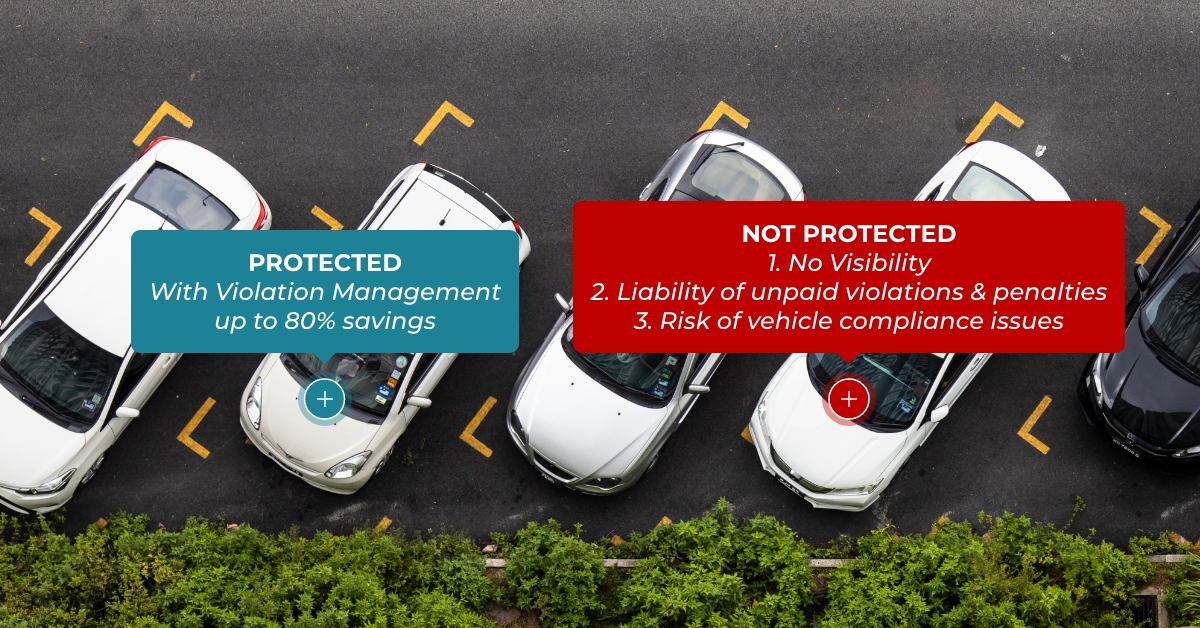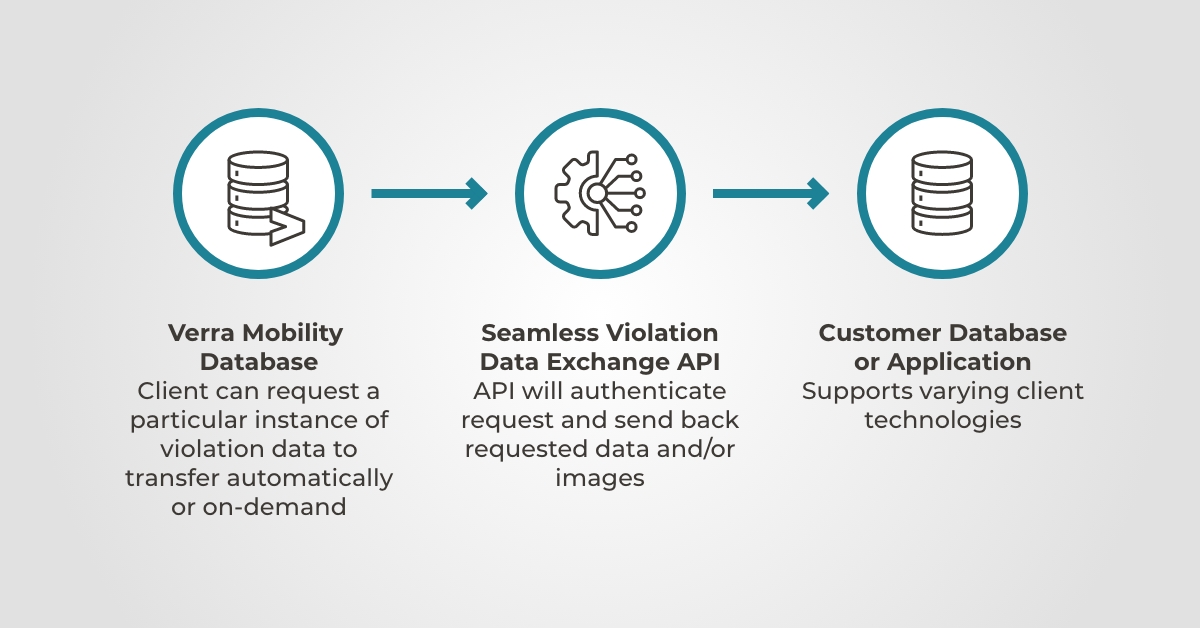
Verra Mobility Joins ARAC, Portugal’s National Car Leasing Association, to Contribute to Portugal’s Commitment to Modernizing Mobility
July 13, 2023
National Stop on Red Week 2023
July 28, 2023
Vehicle citations and violations have always been a major pain point for fleets. However, not only have they been on the rise for the last several years, but now new and proposed violation types stand poised to further complicate matters by making them more difficult to manage, to pay on time, and more.
Many jurisdictions have recognized the significant revenue potential of violations, to the point where they're often seen as a viable way to fill budgetary gaps. As a result, drivers are encountering increasing violation risks on the road. There are well-known violations like red lights, tolling, and parking. Then, there are the new types of violations that are cropping up, like failure to pay congestion charges and idling. These violations only add to both administrative and cost risks during a time when fleets are already grappling with growing expenses from fuel and inflation.
To put it another way, an issue that most already acknowledged was bad is only going to get worse in the not-too-distant future. Fleets must take steps today to be ready and to mitigate those financial and other risks moving forward.
The Growing Challenge of Vehicle Citations and Violations for Fleets
At a baseline, violation management is difficult as there are literally thousands of different issuing authorities in municipalities throughout the country. Most of them manage violation programs that were designed to target individual vehicles, not commercial fleets.
Fleets are also facing new complications in major markets, with New York City's upcoming congestion pricing plan being a prime example. When it goes into effect, those entering New York City from below 60th Street will be charged at least 50% less if they make the trip between midnight and 4 a.m. Entering during other periods of the day will see major pricing fluctuations based on congestion levels.
Vehicle citations for idling are already being issued in New York City, Washington D.C., New Jersey and California. Designed to reduce emissions, the program encourages citizens to report idling vehicles. As idling and congestion violations grow to other municipalities, fleets will need to take steps to reduce exposure to costly fines and administrative headaches.
Issues like these are the reason Verra Mobility offers fleet violation management solutions that continue to grow and evolve as transportation modernizes. It offers a single integration solution for fleets that need comprehensive violation management - a single source of truth that will help fleets better understand and navigate the ever-changing violation landscape. Not only can the solution ward off the negative impact of spiraling fees, but it also provides a mechanism to manage financial risk.
The Impact of Violations on Fleet Operations and Costs
Increased Operating Costs from Violations and Fines
Violation costs are on the rise. Fleets that fail to pay even a small toll on time can see costs quickly rise from $4 to $22 per violation once late fees, penalties, and other administrative costs are included.
The cost liability of these unpaid violations, coupled with the recurring expensive fines and penalties, are only exacerbated by inherently unclear processes regarding how to transfer cost responsibility to drivers when applicable. This can all lead to significantly increased operating costs for fleets, eating into already razor-thin profit margins in many cases.
Heavy Administrative Burden to Manage Violations
One of the many issues associated with self-managing fleet violations is that it soon becomes an uphill battle trying to make sense of it all. Dealing with multiple issuing authority accounts, all with varying devices and payment systems, and with the occasional manual paper violation processing in some areas, the burden adds up.
For example, say you operated a modest-sized fleet with 500 vehicles around the country. This would all but guarantee a steady stream of paper violations coming in from coast to coast. Each one is associated with a different municipality with different rules, payment timelines, processing systems, fee schedules and other variables. You may have every intention of keeping current on these obligations but with so many things working against you, falling behind and getting hit with penalties is all but a foregone conclusion.

Now, imagine how difficult things get with a fleet of 5,000+ vehicles. A fleet is bound to fail and end up paying more than they really need to, particularly if new changes like congestion violations are cropping up all the time. You may also end up dealing with the risk of registration holds and other penalties, all of which can lead to the inability to register and operate vehicles.
Lack of Visibility into Actual Costs
Without access to a comprehensive violation management solution, fleet professionals simply do not have accurate insights of vehicle-level costs and driver responsibilities. On this scale, there is no such thing as a "small issue" - you could be looking at tens of thousands of dollars in unnecessary expenses. The problem is only exacerbated by unclear violation dispute processes that cause confusion and pain points for drivers of loaned vehicles.
Streamlining Violations Management: A Solution for Fleets
Verra Mobility's Violation Management solution helps with these issues and much more. It’s designed not only to help fleets and managers reduce costs, but also to maximize savings, minimize the administrative hassle of dealing with violations, and more. Every dollar saved can then go back into other areas of your business where it can be the most productive.
Verra Mobility processes nearly 7 million violations per year and has saved fleets millions of dollars each year - a trend that shows no signs of slowing anytime soon.

Verra Mobility helps fleets with their violations in many important ways, like:
Efficient Processing of Fleet Violations: A Time and Cost-Saving Approach
Once a fleet and its vehicles are enrolled in the larger Verra Mobility system, violations can be electronically intercepted. The violation management system covers various types of violations like speeding, red light running, and toll violations, in addition to the ones that have started to appear like idling violations, congestion violations, and others that many other violation management solutions don't.
Enhancing Visibility and Compliance: Fleet Violation Data Management
Verra Mobility also collects and organizes violation data for each vehicle in a fleet, building a comprehensive database that includes relevant information like images, dates, times, location information, and the type of violation. This allows fleet management professionals to have access to a centralized, easily accessible to leverage the added visibility at the driver level to understand who may have higher than average incidents and identify drivers for added safety training.
Reducing Administrative Burden: Managing Violations for Fleets
Once violations are detected, the solution can process them efficiently and on time – avoiding added fees, fines, and other types of common fleet violation risks. Verra Mobility offers electronic integration with more than 450 of the largest issuing authorities, which enables the solution to receive and process most violations electronically, dramatically minimizing settlement turnaround time and significantly reducing paper-based processes along the way.
Disputing and Transferring Violation Liability: Assistance for Fleets
During the process of issuing a violation, many agencies often capture photo or video evidence of the event in question. Our solution stores that data for customer use as needed. It can even help them compile that evidence to dispute any inaccurate violations in the future. Verra Mobility leverages this data to recover fines and fees from drivers and to transfer up to 60% of the violations back to the driver, generating massive savings for fleets along the way.
Analyzing Driver Violations: Insights for Fleet Compliance and Safety
Comprehensive analytics and reporting are tools that are about more than just understanding what violations your fleet incurs. Given enough time, they can also be the key to uncovering why these violations are happening, especially new ones that have started to emerge. Fleet operations can analyze violation data in a way that helps identify patterns and gain insights into fleet compliance and safety performance that would have otherwise gone undiscovered. Those reports can then be used to implement corrective actions, such as additional training and education, all in the name of improving driver behavior as much as possible.
Data Integration with Fleet Management Systems
Verra Mobility’s solution can easily integrate with existing fleet management systems via an API, creating a seamless workflow for violation management that fleet leaders can depend on. This allows for data transfer to be streamlined as much as possible, while also bringing with it the added benefits of automated reporting, efficient coordination between different fleet management processes, and more.

Empowering Fleets: Benefits of Verra Mobility's Violation Management Services
In the end, Verra Mobility's solutions are designed to help fleets do more than just effectively pay their violations. They also help to dramatically reduce the administrative burden on organizations, ensure compliance even in a world of rules and regulations that are constantly changing, enhance safety and efficiency, and more – all simultaneously.
For more than a decade, Verra Mobility has offered its services to fleets with nearly 6 million fleet vehicles relying on our solutions. As a leader in smart mobility, it is our responsibility to help you consider emerging violations as well as the ones you're familiar with. From red lights and tolling to new and proposed fleet violation risks like idling and congestion, vehicle citations and violations can be managed with the right solutions. Verra Mobility delivers these solutions to your advantage, in service of the most important goal of all: making roadways around the world safer and more efficient.
Let Us Help You Find a Solution.

